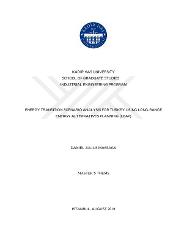| dc.contributor.advisor | Kirkil, Gökhan | en_US |
| dc.contributor.author | Massaga, Daniel Julius | |
| dc.date.accessioned | 2020-02-20T14:38:44Z | |
| dc.date.available | 2020-02-20T14:38:44Z | |
| dc.date.issued | 2019 | |
| dc.identifier.uri | https://hdl.handle.net/20.500.12469/2786 | |
| dc.description.abstract | Fossil fuel thermal power plants constitute a large part of the Turkish electricity generation capacity. The Turkish government has been developing several energy policy documents to evaluate how various renewable energy sources of the country can be utilized optimally in the generation of electricity for the next 30 years. The study considers three scenarios in the transition to renewable energy for Turkey; the business as usual (BAU), energy conservation (EE) and renewable energy (REN) scenarios were modeled with the help of the LEAP (Long-range Energy Alternatives Planning) software. EE scenario considers the use of energy-efficient appliances across all sectors of demand while emphasizing on more efficiency in electricity production activities, whereas REN scenario considers increasing the share of the renewable energy sources as much as possible in the power generation mix. These scenarios were evaluated in terms of cost and environmental impact. The optimized energy efficiency scenario has been shown to be the optimal energy policy option for Turkey in terms of cost and environmental impact. Keywords: renewable energy, energy transition, energy efficiency, LEAP, scenario analysis | en_US |
| dc.description.abstract | Fosil yakıtlı termik santraller, Türkiye'deki elektrik üretim kapasitesinin büyük bir bölümünü
oluşturmaktadır. Türk hükümeti, ülkenin çeşitli yenilenebilir enerji kaynaklarının
önümüzdeki 30 yıl boyunca elektrik üretiminde en iyi şekilde nasıl kullanılabileceğini
değerlendirmek için çeşitli enerji politikası belgeleri geliştirmektedir. Çalışma, Türkiye için
yenilenebilir enerjiye geçişte üç senaryo ele alıyor; her zamanki gibi iş (BAU), enerji
tasarrufu (EE) ve yenilenebilir enerji (REN) senaryoları LEAP (Long-range Energy
Alternatives Planning) yazılımı yardımıyla modellenmiştir. EE senaryosu, tüm elektrik
sektörlerinde enerji verimliliği sağlayan cihazların kullanımını ele alırken, elektrik üretim
faaliyetlerinde daha fazla verime vurgu yaparken, REN senaryosu, yenilenebilir enerji
kaynaklarının elektrik üretim karışımındaki payını mümkün olduğunca arttırmayı
düşünmektedir. Bu senaryolar maliyet ve çevresel etki açısından değerlendirildi. Maliyet
eniyileme kullanılarak çözülen enerji tasarrufu senaryosunun, maliyet ve çevresel etki
açısından Türkiye için en uygun enerji politikası seçeneği olduğu gösterilmiştir. | en_US |
| dc.language.iso | eng | en_US |
| dc.publisher | Kadir Has Üniversitesi | en_US |
| dc.rights | info:eu-repo/semantics/openAccess | en_US |
| dc.subject | renewable energy | en_US |
| dc.subject | energy transition | en_US |
| dc.subject | energy efficiency | en_US |
| dc.subject | LEAP | en_US |
| dc.subject | scenario analysis | en_US |
| dc.subject | LEAP | en_US |
| dc.subject | enerji tasarrufu | en_US |
| dc.subject | yenilenebilir enerji | en_US |
| dc.subject | senaryo analizi | en_US |
| dc.title | Energy transition scenario analysis for Turkey using long range energy alternatives planning (LEAP) | en_US |
| dc.type | masterThesis | en_US |
| dc.department | Enstitüler, Lisansüstü Eğitim Enstitüsü, Endüstri Mühendisliği Ana Bilim Dalı | en_US |
| dc.relation.publicationcategory | Tez | en_US |
| dc.identifier.yoktezid | 592006 | en_US |
















